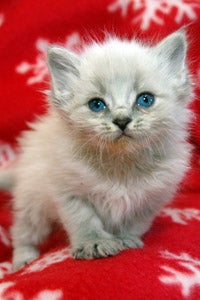Trap/neuter/return (TNR) for cats on the Navajo Nation

For three hot and blustery days, Best Friends staff and volunteers came together to trap, neuter and return (TNR) the community (aka feral) cats of an area called the Gap. Located on the Navajo Nation in Arizona, approximately 125 miles from the Sanctuary, the oft-overlooked community received some much-appreciated support over Mother's Day weekend. Beyond spaying or neutering 101 community cats of the Gap, Best Friends also donated four pallets of pet food during this project.
"It's an underserved area, and the people don't have access to the services they need for their animals," says Janice Dankert, community cat program supervisor.
Pulling together to help cats on the Navajo Nation
Best Friends' emergency response team brought a climate-controlled trailer to the reservation. The cats waited in the trailer to be transported to the Best Friends clinic at the Sanctuary, where the spay/neuter surgeries would be performed. The majority of owned cats who were brought in by local residents for spaying or neutering did not arrive in a carrier, so team effort was imperative to keep the cats safe while they were awaiting transport.
Emergency response manager John Garcia was thrilled: "Overall, it was a huge success for the community, and by helping the animals we were also able to help further educate (the people) on best practices for their companion animals' health. It's always fun to work with the Navajo Nation. Their gratitude is always astounding, and we see an impact every trip we make."
Volunteer Linda Mitchell, who moved to Kanab specifically to work with Best Friends after retirement, was also one of the folks instrumental in making the endeavor a success. She pitched in to sanitize the cages in between batches of cats that were picked up and then transported to the clinic. Everything had to run like a well-oiled machine.
"I felt like I was part of Best Friends, making life better for the animals," says Linda. "It felt totally wonderful to be part of the project."
The Best Friends clinic also went the extra mile to accommodate this mass outreach program, and though a bit short staffed themselves, brought in an experienced high-volume spay/neuter surgeon, veterinarian Dr. David Maloney, to get the cats the quality care they deserve. Additional clinic support was essential, with vet techs Steve Lund, Lori Kendall and Kerry Eddy making sure the project went without a hitch.
 Unexpected benefits of TNR project
Unexpected benefits of TNR project
In addition to working with the local chapter house on the reservation - the hub for the grassroots marketing strategy (flyers and word of mouth) - Lorraine Homer, a Best Friends employee and Navajo resident, made critical connections to ensure the project went smoothly.
"The animals are as important as the people for a community's overall health," shares Lorraine. "Everyone really appreciated having their animals fixed." Another benefit: With the cats' ability to reproduce stopped, the animals' need to roam is reduced and annoying mating behaviors are eliminated.
In addition to fixing the cats, 20 kittens were placed into foster homes with Best Friends staff, including Braveheart, who was limping, and now, post-surgery, is recovering from a pellet wound.
For information on how you can help community cats in your area, click here for resources.
Photos by Molly Wald and Jennifer Hayes